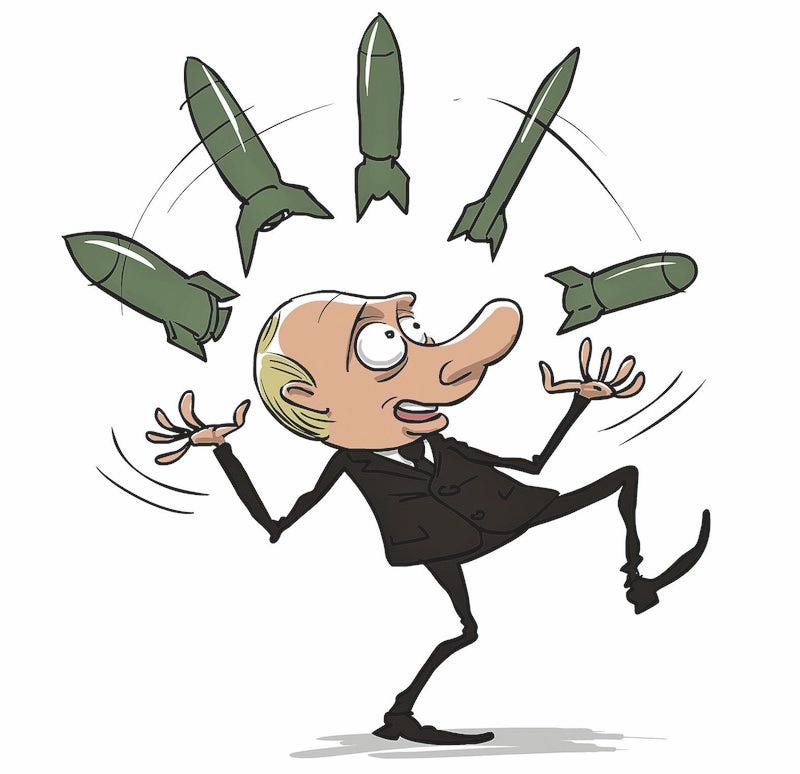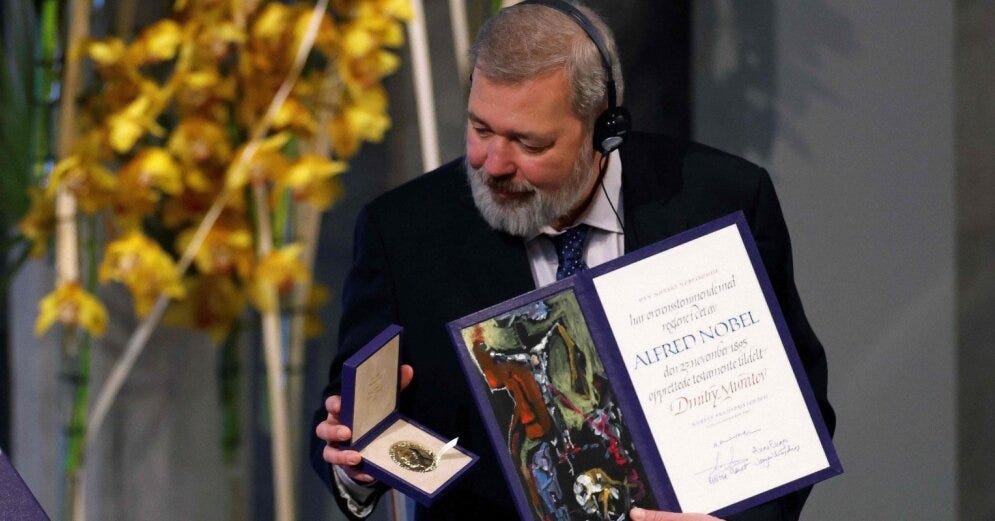Ready to use nukes
New sentence for Navalny
Nobel Laureate medal to help Ukrainians
We will change their minds
Another step back
Learning Iranian lessons
Maybe it’s not forever?
A subtle hint
Forget the default?
Russia and China need the West
The next issue will appear on March 24.
Ready to use nukes
Russia may use nuclear weapons only in case of a real threat to the existence of the country, presidential spokesman Dmitry Peskov said.
We have a National Security Concept, it's non-classified, you can read all the reasons why nuclear weapons can be used. That is, if there is a threat to the existence of the country, it can be used in accordance with our concept.
Vladimir Putin repeated several tomes the thesis about the threat to Russia's security and existence posed by the United States, the West, and Ukraine in his declaration on the beginning of the invasion of Ukraine.
For the United States and its allies this is the so-called policy of containment of Russia, an obvious geopolitical dividend. But for our country, it is ultimately a matter of life and death, a matter of our historical future as a people. And this is not an exaggeration - it is so. This is a real threat not just to our interests, but to the very existence of our state, its sovereignty. This is the red line that has been repeatedly spoken about. They have crossed it…
But Russia cannot feel safe, cannot develop, cannot exist with a constant threat emanating from the territory of present-day Ukraine.
I repeat, our actions [ ivasion of Ukraine] are self-defense against the threats posed to us.
Given that since then there has been no improvement in relations between Russia and the countries that "threaten its security," Peskov's statement can be seen as a warning that Russia is ready to use nuclear weapons at any moment…
A miracle didn’t happen
The court sentenced politician Alexei Navalny to nine years in a strict-regime penal colony and a fine of 1.2 million rubles, agreeing with all the charges against him and finding the arguments of the investigation and the prosecutor convincing.
After announcing the verdict, police detained Alexei Navalny’s lawyers. Olga Mikhailova and Vadim Kobzev, during their conversation with journalists and took them to the police station. After a while, the lawyers were released: It seems the whole point of what happened was to limit the lawyers’ communication with the press.
The Kremlin’s decision is understandable and pragmatic: Just as in the case of Boris Nemtsov’s murder, the Russian opposition is losing its leader. Given the tightening of the domestic political regime and the total censorship, one could say that Putin’s opponents are permanently represented in the political space.
Supporting Ukraine
Novaya Gazeta Chief Editor Dmitri Muratov, Nobel Peace Prize Laureate in 2021, announced that he would sell his Nobel Medal and donate the money to a fund to help Ukrainian refugees. “Please respond to auction houses that will auction off this world-renowned award,” he wrote on the newspaper’s website. Olav Njølstad, the Norwegian Nobel Institute Director, said, “The Norwegian Nobel Committee fully understands and supports Dmitri Muratov’s decision. It can provide moral and material support for one of the most worthy causes.”
There are few dissenters, and we will change their minds
The Kremlin hears the views of the minority who disagree with Russia’s special operation in Ukraine and hopes that these people will come to realize what is happening, Russian presidential spokesman Dmitry Peskov told reporters.
“There are few of them. The overwhelming majority of citizens and statistics and polls show that over 75% support the operation and support the Russian President,” Peskov said. In his words, “This is an irrefutable fact.” According to Peskov, less than 25% of Russians do not agree with the special operation. Asked if the Kremlin hears these people, the presidential spokesman said: “Opinion is heard, but still a minority is a minority.”
“You can see that there is a very active clarification of the goals and objectives of this operation, of its reasons. We hope that those who disagree will understand what is going on. Also, it’s essential that those who disagree begin to navigate the streams of lies from the West about what’s going on and understand that not everything is true that’s being given out there in the news.”
Taking a step back again
I have mentioned several times the chaotic and ill-conceived nature of the currency restrictions in Russia, which made the authorities revise or cancel them several days after they were announced.
Another example of this was the cancellation of restrictions on transactions in Russian real estate that were introduced three weeks ago for non-residents from “unfriendly countries.” As a result, banks suspended financing of many investment projects until they provided evidence that the ultimate beneficiaries of the companies were Russian residents. In addition, for the same reason, the Federal Register (Rosreestr) has suspended the registration of all real estate transactions until the buyers and sellers provide evidence of absence of ties with “unfriendly states” (while no one has explained what such evidence might look like).
As a result, the government commission allowed residents to sell real estate to non-residents and buy real estate from non-residents associated with “unfriendly states.” At the same time, funds received by non-residents should be deposited into a special “C” account without the right to convert or repatriate them without special permission.
Learning Iranian lessons
Almost 80 planes of Russian airlines have been seized abroad, said the Minister of Transport, Vitaly Savelyev.
“We had a total of 1,367 planes in the country. We lost 78 machines; they were arrested at our flights,” the Minister said. He said the planes were arrested, including in countries friendly to Russia—Turkey, Azerbaijan, and Armenia.
We have already transferred [to the Russian registry] almost 800 machines, we insure them in Russian reinsurance companies, under the Central Bank, which is—the planes remain. We are looking for legal ways to negotiate with lessors and resolve this issue, but so far, we have failed. There is a ban and a demand for return; they do not want to enter into negotiations to compensate them for payment and repurchase of ships from them by Russian airlines. Nevertheless, we are not giving up hope, and we are not giving them away. Because giving them away means leaving ourselves without aviation. You understand this, which is why the government made such a decision.
Flights are ongoing, but at some point, carriers will need spare parts for aircraft, the Minister admitted. According to him, the authorities are looking for a solution to this issue, currently guided by the experience of Iran, which has been under sanctions for many years. The Iranian experience is that some aircraft are disassembled into components used to repair aircraft that continue flying.
The Minister hopes that all is not forever
Russia may have to say goodbye to several foreign automakers, said the head of the Ministry of Industry and Trade, Denis Manturov. He said that now the government representatives are in a dialogue with all automakers and foreign brands. According to the Minister, Russia has a clear understanding that some will stay in the Russian market and maintain production capacity and supply of components. “We may have to say goodbye to some, unfortunately, because we cannot wait indefinitely,” Manturov warned. According to him, an inoperative enterprise leads to a failure to pay taxes and to degraded production capabilities. The Minister expressed hope that the parties would be able to come to a jointly acceptable solution by the end of March or early April.
It is difficult for me to understand the basis for such optimism of the Russian Minister. So far, nothing indicates that Russia is ready to stop its aggression against Ukraine and, at least, to start negotiations on compensation for the damage inflicted.
A subtle hint
Russian Deputy Foreign Minister Sergei Ryabkov accused the U.S. of wanting to sever diplomatic relations.
The U.S. is leading the way to a rupture; there is no doubt about that. We insist on the need to normalize the genre of communication, at least in elementary aspects. We insist that American colleagues reflect on the consequences of the policy of bloody suppression of unwanted regimes in various regions of the world, which they have pursued for many decades.
We insist that responsibility for the possible consequences of what is happening [in Ukraine] lies entirely [with] Washington.
I think the Kremlin has begun discussing this scenario, and Sergei Ryabkov’s statement is a preparation of public opinion for the possible adoption of such a decision.
Forget the default?
The Russian Ministry of Finance informs that funds for the payment of income on bonds of external bond issues of the Russian Federation with maturity in 2029 of $65.63 million maturing on March 21, 2022, were received by the ‘National Settlement Depository.’
These bonds were issued in 2019 and contained a clause on the possibility of servicing and repayment of obligations in rubles. The topic of Russia defaulting on its foreign debt was removed from the agenda after the Kremlin became convinced that the disadvantages of such a decision significantly outweigh the pros.
No links with China without West
Sberbank stopped allowing its clients to transfer funds to their wallets in the Chinese payment system Alipay, the launch of which was announced on February 1. This service was provided in partnership with Western Union, which has ceased to operate in Russia.
Better not to trade
Trading on the government bond market, which resumed on Monday, attracted the attention mainly of individual investors. Large bondholders—banks and pension and insurance companies—refrained from trading because selling bonds would force them to revalue their assets and record significant losses. In case of non-participation in the auction, the Central bank allowed this category of investors not to make a daily revaluation of portfolios but to continue to report bonds at pre-war prices.
The Bank of Russia, as promised, took part in the auction—for almost all traded bond issues, it placed buy orders at the prices corresponding to the yield of 20% (the level of the key rate), but there were very few investors willing to sell at such prices.





